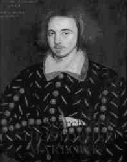|
 Born the same year
as Shakespeare, Christopher Marlowe
was to become the first great poet of the theatre's second great
age. His life, much like the lives of his characters, would be
short and violent. Born the same year
as Shakespeare, Christopher Marlowe
was to become the first great poet of the theatre's second great
age. His life, much like the lives of his characters, would be
short and violent.
The son of a shoemaker, Marlowe attended King's School, Canterbury
and Corpus Christi College where he received his Bachelor of
Arts in 1584 and his Masters degree three years later. According
to university records, Marlowe disappeared frequently during
his last years at school, exceeding the number of absences permitted
him by statute and putting his degree in jeopardy. Apparently,
much of this time was spent in Rheims among the Catholics who
were plotting against Queen Elizabeth's protestant regime. Because
of his absences and the fact that he refused to take holy orders,
the university refused, for a time, to confer his degree, but
the authorities intervened, and the degree was eventually granted.
Although we cannot be certain, Marlowe may have fought in
the wars in the Low Country after graduation. What we can be
certain of is that he settled in London in 1587 and began his
career as a playwright--although he may still have been in the
employ of the secret service as well. The young poet plunged
himself into a social circle that included such colorful literary
figures as Sir Phillip Sidney and Sir Walter Raleigh. He shared
a room with fellow playwright Thomas Kyd
and was often seen frequenting the taverns of London with the
likes of Robert Greene and Thomas Nashe. His magnificent appearance,
impulsiveness, and bejeweled costumes soon became the talk of
the town.
Primed by this new-found intellectual stimulation, Marlowe
soon wrote Tamburlaine, the first notable English play
in blank verse. Elizabethan drama had reached the foothills and
was beginning its final ascent when Marlowe came onto the scene.
All that was needed was a bold leap such as no one had yet dared
or been able to make--and Marlowe was determined to make that
leap.
He had the advantage of having his plays presented by the
Lord Admiral's company. While his contemporaries were watching
their work performed by church boys, Marlowe saw his dramas staged
by full-chested men such as the seven-foot-tall, majestic Edward
Alleyn.
No playwright had hitherto invoked the world, the flesh, and
the devil so magnificently in plays such as Dr. Faustus, The
Jew of Malta, and Edward II. The young poet, however,
had neither wealth nor position, and the disparity between his
dreams and the reality of his situation began to weigh upon him.
He grew more and more restless and irritable until even his friends
began to lose patience with him.
In 1593, after pointing out what he considered to be inconsistencies
in the Bible, Marlowe fell under suspicion of heresy. His roommate,
Thomas Kyd, was tortured into giving
evidence against him, but before he could be brought before the
Privy Council, the twenty-nine-year-old poet was found dead at
Dame Eleanore Bull's tavern in Deptford. On May 30, 1593, he
had gone to the tavern to have dinner with some friends. According
to witnesses, there was a quarrel over the bill and Marlowe drew
his dagger on another man who, defending himself, drove the dagger
back into the young poet's eye, mortally wounding him. There
is reason to believe, however, that Marlowe may have been deliberately
provoked and murdered in order to prevent his arrest. Had he
been brought before the Privy Council, he might have implicated
men of importance such as Raleigh.
Christopher Marlowe's contribution to the drama, however,
was complete. He had returned high poetry to its rightful place
on the stage and left us characters as fiery and passionate as
their creator, preparing the way for a poet even greater than
himself--William Shakespeare.
|